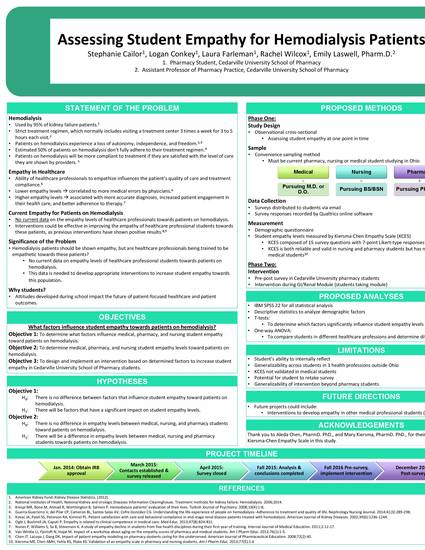
- Empathy,
- hemodialysis,
- student empathy,
- KCES
Hemodialysis is a treatment process utilized by kidney patients to filter their blood. These patients are required to undergo an intensive regimen including hemodialysis treatments multiple times per week lasting 3-5 hours each. As a result of hemodialysis, patients experience decreased autonomy, freedom, and independence. An estimated 50% of these patients do not adhere to their treatment regimen. Patients on hemodialysis may be more compliant to their treatment if they are satisfied with the level of care and empathy they perceive from their healthcare providers. Currently there is no literature measuring empathy levels of healthcare professionals or students towards patients on hemodialysis. Examining student empathy levels toward this patient population provides a good representation of future healthcare professional empathy levels. Attitudes developed during school impact the future of patient-focused healthcare and ultimately, patient outcomes.
The objectives of this study include: to determine the factors influencing medical, nursing, and pharmacy students; to determine empathy levels for medical, nursing, and pharmacy students; and to design and implement an intervention based on determined factors to increase student empathy in pharmacy students.
This study will be conducted in two phases. The first phase involves contacting different medical, nursing, and pharmacy schools in Ohio. We will assess medical, nursing, and pharmacy student’s empathy towards patients on hemodialysis. A survey will be created consisting of the Kiersma Chen Empathy Scale (KCES) to assess empathy and questions addressing factors influencing student empathy. An educational intervention will then be developed in the second phase based on phase one results. The intervention will be implemented in Cedarville University’s School of Pharmacy second year professional students. A pre-post test will be administered to these pharmacy students in order to evaluate the effectiveness of intervention in increasing their empathy levels.
Data from phase one will be exported from Qualtrics software to IBM SPSS 22® for statistical analysis. Analysis will be performed to determine possible factors influencing student empathy and compare difference between students in medical, nursing, and pharmacy health professions.
Available at: http://works.bepress.com/emily_laswell/16/
